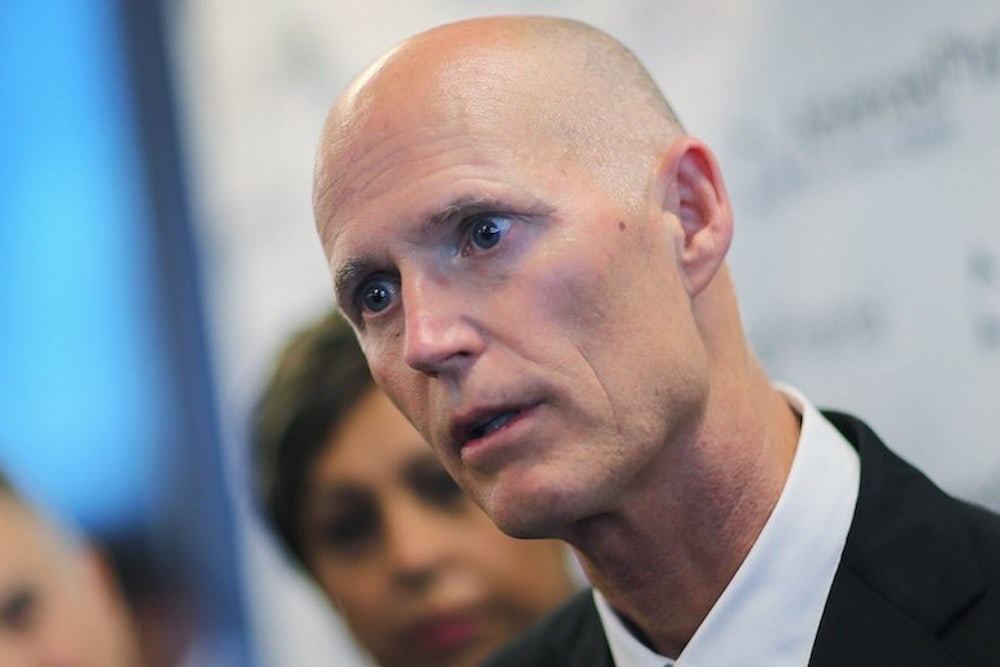The Florida state government has been a hotbed of opposition to Obamacare, and has succeeded in resisting the law’s Medicaid expansion, in large part because of the state's Low Income Pool: a multi-billion dollar, 10-year-old pilot program through which, right now, the federal government subsidizes health care providers who treat the poor.
Also right now, in Florida, Governor Rick Scott wants to enact hundreds of millions of dollars in annual tax cuts.
The budget room for those tax cuts, in other words, exists because the federal government is spending money—money that comes with no guarantee—in a way that bolsters Florida’s resistance to Obamacare.
Not keen on financing opposition to itself, the Obama administration is leaning toward ending this sweet arrangement, and phasing out the Low Income Pool, which has in any case grown obsolete in a world where Florida can adopt the Medicaid expansion and provide insurance to nearly a million of its poor citizens.
All of which is to say that if Scott and Florida Republicans want their tax cuts, they will have to use expanded Medicaid to fill the budget hole where the Low Income Pool used to be. But rather than push against that open door, Scott announced Thursday that he will sue the federal government. Specifically, he’s arguing that by rescinding the Low Income Pool, the Obama administration is coercing Florida into participating in Obamacare, so the Low Income Pool must continue. Put another way, he’s asking the courts to force the feds to bail out his tax cut.
This is all playing out against the backdrop of King v. Burwell, in which conservatives have asked the Supreme Court to rescind billions of dollars in Affordable Care Act subsidies in their own states—money they claim is contingent upon them establishing their own exchanges. Like most Republican governors, Rick Scott didn’t establish an exchange, but for some reason he isn’t sounding the coercion alarm over King.
Scott’s argument is transparently frivolous, but it underscores the extent to which the GOP’s deranged resistance to Obamacare is boomeranging on itself. As Greg Sargent notes at the Washington Post, “Scott’s lawsuit is designed to get the administration to fork over federal money for health care—but only if it isn’t part of Obamacare.” Without that money, Scott probably won’t get his tax cuts. Which means that in Florida, the GOP’s commitment to tax cuts is running up against its Massive Resistance to Obamacare. And the tax cuts might lose.
This adamant opposition to the Medicaid expansion is a relatively recent development. Scott claims his opposition stems from the administration’s coolness to the Low Income Pool. If the federal government can just end that program, how can Floridians trust them to commit to their end of the Medicaid expansion? But that doesn’t wash. The Low Income Pool was scheduled to expire, whereas the federal government is obligated by law to fund 90 percent of the Medicaid expansion in perpetuity.
Florida’s Senate president—a Republican—thinks Scott is being ridiculous. He released a statement that refutes Scott’s objection to the Medicaid expansion and undermines the lawsuit:
The federal government has no obligation to provide LIP funding, or to work within our timeframe. While we respect Governor Scott’s authority to protect the state’s interests in the way he sees fit, we have a constitutional responsibility to pass a balanced budget by a specific deadline. From where I sit, it is difficult to understand how suing [the federal government] on day 45 of a 60 day session regarding an issue the state has been aware of for the last 12 months will yield a timely resolution to the critical health care challenges facing our state. The Senate budget anticipated the potential reduction or elimination of LIP funding and included solutions to provide Floridians access to health care services and coverage. We remain hopeful CMS will approve the Senate proposal.
A likelier explanation for Scott’s change of heart is a combination of anti-Medicaid spending by the Koch-backed advocacy group Americans for Prosperity, and entrenched Obamacare opposition in the Florida House. Sensing that the Medicaid expansion might be in danger, Scott flipped, rather than be caught on the losing side of it.
But Scott could have solved this problem a long time ago if he’d ever fought for Medicaid expansion earnestly, and could solve it now by teaming up with the Senate to stare down the House.
Instead Scott is suing the federal government to bail him out of a self-made crisis. This isn’t an anomaly, but a pattern. Across the country, Republican governors are coping with the consequences of their own Obamacare intransigence—staring into a future where their insurance markets get destroyed by virtue of their refusal to help implement Obamacare and their unwillingness to take on the right as it pursued litigation.
It was inevitable that as Obamacare became more entrenched, Republicans would see their opposition to the law come into tension with their other core interests. This is exactly what’s happened, and to some extent it has exposed weaknesses in the resistance strategy. But that resistance—to the idea of providing health insurance to the poor—remains very strong. Stronger, perhaps, than the allure of tax cuts.
